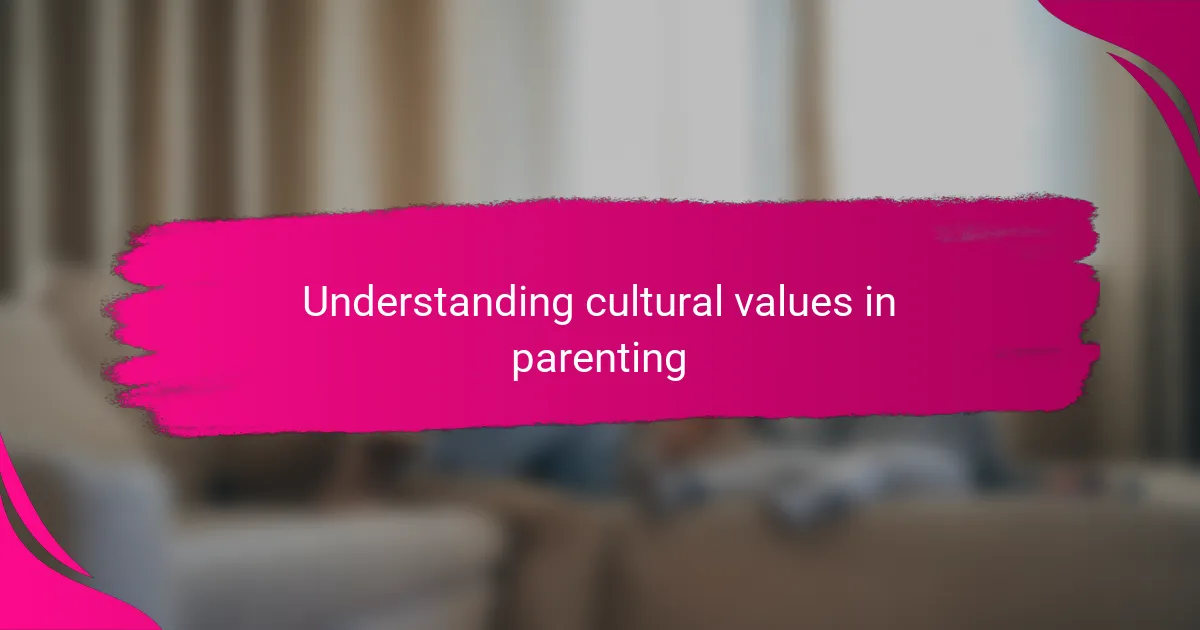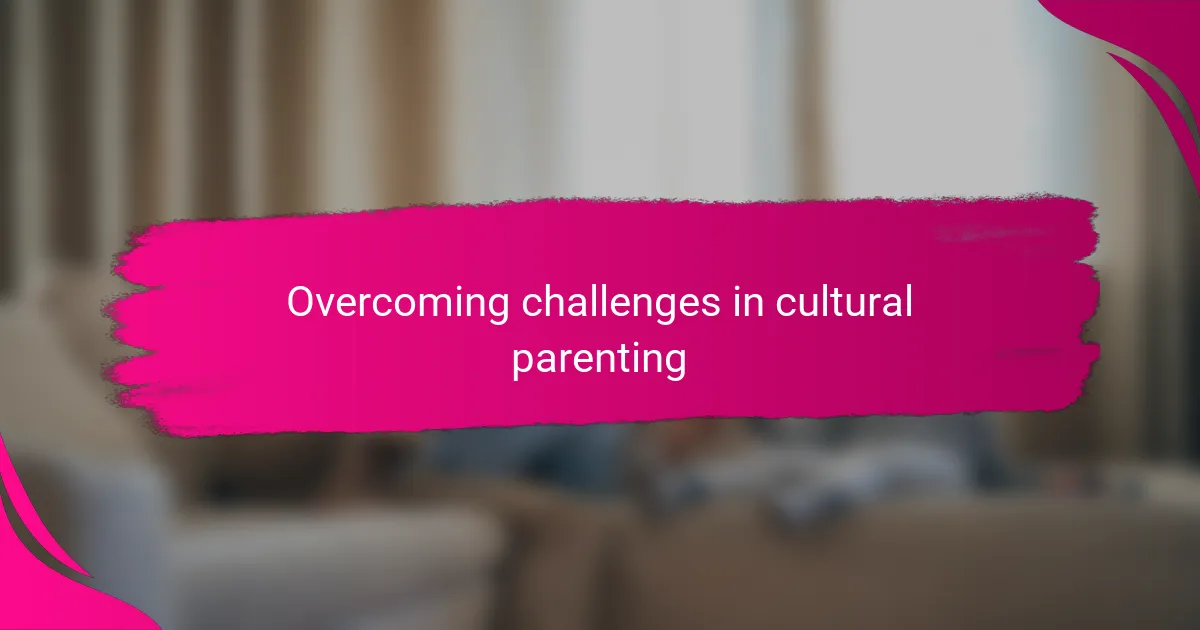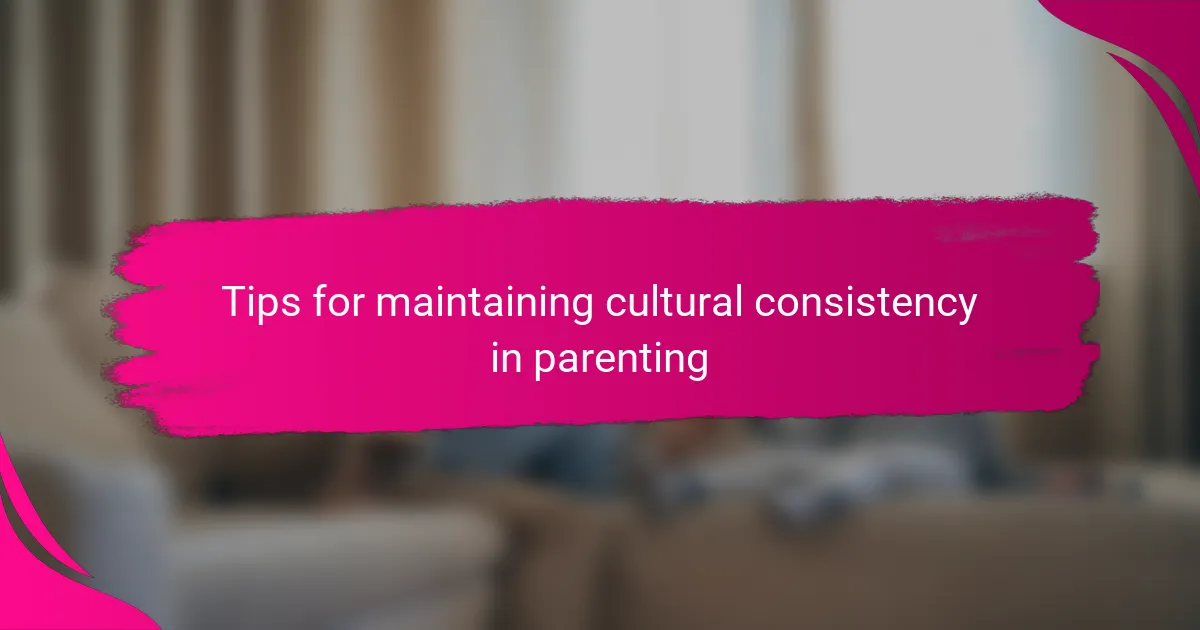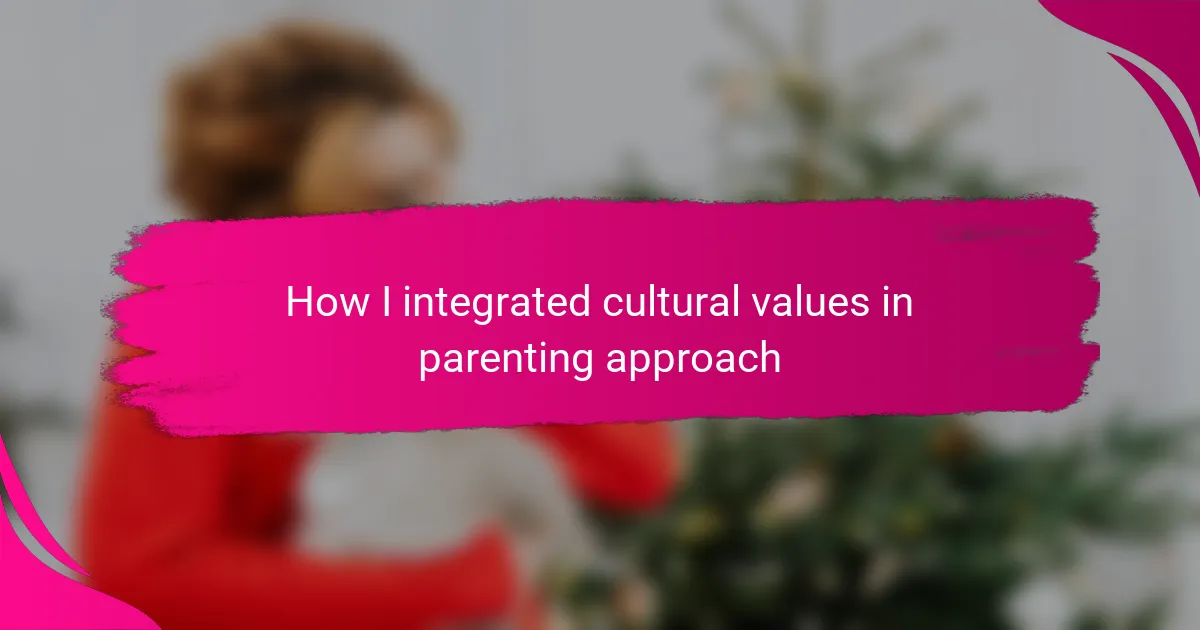Key takeaways
- Understanding cultural values in parenting fosters a deeper connection and appreciation for family traditions, shaping children’s identities and behavior.
- Integrating cultural values helps create stability, empathy, and meaningful connections within the family, enriching the parenting experience.
- Practical approaches, such as storytelling and celebrating traditions, effectively convey cultural values to children in relatable ways.
- Navigating cultural differences requires flexibility and open communication, allowing families to blend heritage with modern practices while maintaining core values.

Understanding cultural values in parenting
Understanding cultural values in parenting means recognizing the invisible threads that guide how we raise our children. When I first reflected on my own family’s traditions, I realized they shaped not just routines but deep beliefs about respect, independence, and community. Have you ever wondered how much of your parenting style is rooted in the stories and customs you grew up with?
For me, it was eye-opening to see how certain values—like prioritizing family loyalty or encouraging self-reliance—played a silent but powerful role in daily decisions. These cultural foundations often carry emotional weight, tying us to ancestors and shared experiences that influence how we nurture. Appreciating these values helps me connect more authentically with my children and their unique identities.
At times, understanding cultural values feels like decoding a personal language passed down through generations. It’s not always easy, but embracing this complexity fosters empathy and patience, both essential in parenting. How might your parenting change if you viewed your cultural values as living guides rather than fixed rules?

Key cultural values influencing parenting
Cultural values like respect for elders or the importance of community aren’t just abstract ideas—they become the compass that directs everyday parenting choices. I remember how my parents emphasized listening carefully to older family members, teaching me not just manners but a sense of belonging. Have you noticed how these subtle lessons often shape your child’s behavior more than explicit rules?
In some cultures, fostering independence early on is vital, while in others, interdependence and close family bonds take precedence. Growing up, I was encouraged to explore confidently, but also to check in with relatives regularly, blending autonomy with connection. This balance influenced how I now support my children’s growth without letting go of our collective roots.
Sometimes, these cultural values clash with modern parenting advice, and that’s where I’ve had to pause and reflect. What felt natural to me didn’t always align with mainstream ideas, yet I found strength in honoring my heritage while adapting to today’s world. Isn’t parenting about weaving together old wisdom and new insights to fit our unique families?

Benefits of integrating cultural values
Integrating cultural values into parenting offers a sense of stability and identity that children can carry throughout their lives. I’ve seen how grounding my children in our traditions gives them a stronger sense of belonging and confidence, especially when they face the challenges of a diverse world. Don’t you think feeling connected to something larger than ourselves helps children navigate uncertainty better?
Another benefit I’ve noticed is how cultural values nurture empathy and respect within the family. When I share stories about honoring elders or community support, my kids begin to see relationships as more than transactions—they become meaningful connections. This deeper appreciation encourages kindness and responsibility, qualities I believe every parent hopes to inspire.
Lastly, integrating cultural values creates a bridge between generations that feels deeply rewarding. I recall moments when my children eagerly listened to my parents’ memories, sparking conversations that brought our family closer. Wouldn’t you agree that this shared understanding enriches the whole family tapestry, making parenting not just about guidance but legacy?

Practical ways to include cultural values
One practical way I’ve found to include cultural values is by weaving our family stories into everyday moments. For instance, during meals or bedtime, I share tales from my childhood or our ancestors’ experiences, connecting lessons about perseverance and respect to my kids’ daily lives. Have you tried storytelling as a tool to bring cultural values alive in your home?
Another approach is celebrating traditional holidays and rituals, not just as events but as opportunities to explore values like gratitude, community, and honor. When we prepare special foods or perform customary activities together, it becomes more than a celebration—it’s a living classroom where my children absorb meaning naturally. How might your family traditions serve as a foundation for teaching values?
Lastly, I consciously practice language use and respectful behaviors that reflect our heritage. Whether it’s encouraging polite greetings or involving elders in decision-making, these small, consistent actions subtly reinforce cultural priorities. I wonder, what everyday habits in your family silently carry cultural wisdom forward?

Overcoming challenges in cultural parenting
Navigating cultural differences within parenting hasn’t always been straightforward for me. I’ve often found myself caught between wanting to honor traditions and adapting to new environments where those values might not be fully understood. Have you ever faced moments when your family’s way felt out of sync with the world around you?
One challenge I encountered was helping my children embrace values like respect for elders in a society that prizes individualism. It required patience and creative conversations to explain why certain cultural norms mattered deeply to us, even if they seemed unusual to others. Over time, I noticed these efforts deepened my kids’ appreciation for our heritage rather than creating distance.
I also learned that flexibility is key. Holding tightly to every old practice can sometimes create tension, so I choose to focus on the core principles behind our traditions instead of rigid rituals. Have you found that blending respect for culture with openness to change makes parenting feel more like a collaboration than a conflict? This balance has made a big difference in how we embrace our identity together.

Personal experiences with cultural parenting
When I first started blending cultural values into my parenting, I remember a simple moment during a family dinner where my child instinctively offered the eldest relative the first serving. It struck me how deeply these small gestures of respect were already part of us, passed down without words but felt strongly in the heart. Have you noticed those quiet, everyday actions in your family that speak volumes about your heritage?
There was also a time when my child questioned why we practiced certain traditions, like specific greetings or storytelling rituals. Instead of brushing it off, I shared the stories behind them—the lessons, the struggles, and the joys of our ancestors—and suddenly, those moments became richer, filled with meaning and curiosity rather than routine. Isn’t it amazing how opening up these conversations can transform culture from a list of do’s and don’ts into a living, breathing part of family life?
Sometimes, integrating cultural values hasn’t been easy. I recall feeling self-conscious when my parenting approach, rooted in tradition, didn’t quite fit with prevailing norms at school or among friends. But over time, I realized that honoring our background gave my children a unique sense of identity and strength that I wouldn’t trade. Have you experienced the challenge of standing firm in your values, and what did that teach you about resilience and adaptation?

Tips for maintaining cultural consistency in parenting
One way I’ve kept cultural consistency alive is by creating small but meaningful routines that reflect our heritage. For example, we start each day with a simple greeting that carries respect and intention—this practice quietly anchors us and reminds my kids who we are. How might a daily tradition like this help your family reinforce core values without feeling forced?
I’ve also found that involving extended family in parenting moments strengthens cultural ties and consistency. When elders share their wisdom or join in celebrating milestones, it adds layers of meaning that textbooks or modern advice can’t replicate. Have you noticed how children naturally absorb values when they see them lived out by those they love?
Sometimes, consistency means being willing to explain and adapt cultural practices so they make sense in today’s world. I remember patiently discussing with my children why certain rituals matter, even when their friends don’t follow them. This openness hasn’t weakened our values but made them more vibrant and relevant. Could your honest conversations about culture become the bridge that keeps your family’s legacy thriving?
